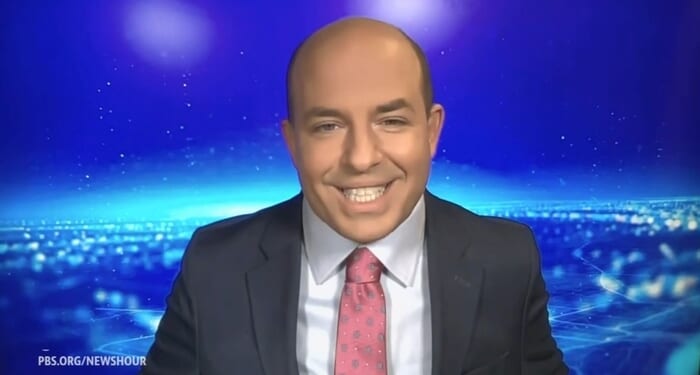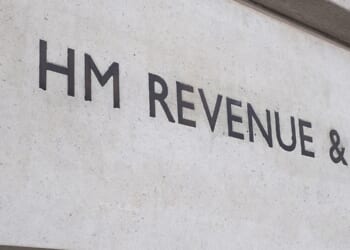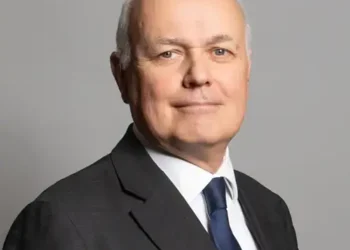PBS News Hour did an extended segment on the crisis currently roiling the British Broadcasting Corporation (BBC) over its grotesque edit of President Trump’s speech at The Ellipse on January 6th, 2021. This could have been an opportunity for reflection on what ails the media in this environment, and on the dangers of having Trump Derangement Syndrome infect editorial choices. Instead, we got seven-plus minutes of Brian Stelter doing damage control for the Beeb.
Anchor Geoff Bennett served here as an appliance more than as an interviewer. This was clearly Stelter’s segment- a platform for unchecked “context” and “nuance” on what the resignations at the BBC really mean, as opposed to a giant scandal brought forth by unfettered systemic media bias.
Watch this summation of Stelter’s spin on the BBC:
GEOFF BENNETT: And conservative critics in the U.K. are alleging a systemic left-wing bias at the BBC. What does all of this mean for the BBC’s international reporting, and its reputation?
BRIAN STELTER: Right. Three things are going on simultaneously. You have this actual… pic.twitter.com/F62WKF6Vu8
— Jorge Bonilla (@BonillaJL) November 13, 2025
Here, as Stelter has done often throughout this BBC cycle, is the diminishment and isolation of the actual video splicing. Stelter frames it as a giant but narrow mistake that doesn’t obscure the broader meaning of Trump’s words and deeds on January 6th. In sum, Stelter is pleading “fake but accurate” on behalf of the BBC. But as I often tell people, deliberate actions are not “mistakes.” Splicing two video segments nearly an hour apart is not a “mistake”, but an intentional editorial decision. And someone who spent the pandemic and recovery arguing for censorship (“freedom of speech but not freedom of reach”, anyone?) should know better. The idea that the edit wasn’t “malicious”, as Stelter says earlier in the interview, is patently offensive.
Stelter on PBS: “There is no indication” that the BBC’s splicing of Trump’s J6 speech was “malicious”.
GEOFF BENNETT: And stepping back, we know the established timeline, we know all of the testimony about what Donald Trump did not do on January 6th, his inaction as the violence… pic.twitter.com/1NkS2lOVsg
— Jorge Bonilla (@BonillaJL) November 13, 2025
Stelter then laments the conservative targeting of the BBC, as well as competitors potentially “feasting on the BBC” due to their self-inflicted woes. It’s the politically fraught environment, you see, and not the massive fake news that led to the resignations of these two fine media professionals. Finally, there is the matter of the licensing fee, which is collected from British taxpayers.
The whole exercise was designed to exculpate the BBC for their willful transgressions. It is only fitting that PBS, defunded for spreading disinformation and fake news, cover the debacle at the BBC.
Click “expand” to view the full transcript of the aforementioned report as aired on PBS News Hour on Tuesday, November 11th, 2025:
GEOFF BENNETT: President Trump is threatening to sue the BBC for $1 billion, claiming the broadcaster misrepresented his role in the January 6th Capitol attack. According to Mr. Trump’s legal team, a BBC documentary that aired ahead of the 2024 presidential election cut together remarks made by Mr. Trump to make it appear as if he urged his supporters to, in his words, “fight like hell” immediately after directing them to march to the U.S. Capitol. In reality, the two lines came more than 50 minutes apart. The fallout has been swift. Following the controversy and mounting backlash over perceived bias at the BBC, two of the broadcaster’s most senior executives resigned. That’s Director General Tim Davie, and BBC News Chief Executive Deborah Turness. Turness defended the BBC’s reputation while speaking to reporters this week.
DEBORAH TURNESS: I stepped down over the weekend because the buck stops with me. But I’d like to make one thing very clear: BBC News is not institutionally biased. That’s why it’s the world’s most trusted news provider.
BENNETT: And we’re joined now by Brian Stelter, chief media analyst for CNN. Brian, it’s always good to see you, thank you for being with us.
BRIAN STELTER: Thanks.
BENNETT: So this documentary program in question, “Panorama”- it’s the crown jewel of the BBC’s reporting operation. Help us understand more about this editorial breach, the edit itself, and why President Trump and his supporters are saying this misled viewers.
STELTER: That’s right. This is an important program on the BBC schedule, and this documentary aired right before the U.S. presidential election- it was a documentary about Trump’s reelection campaign called “Trump, a Second Chance,” it interviewed Trump voters and featured the voices of voters in America. I actually think if the Trump white house watched the documentary, it would find a lot to like in the documentary. But there is this moment where the January 6th video was shown, Trump’s speech at The Ellipse was shown, and it was edited in a way that was clearly a big screwup. I would call this a big screwup- a big journalistic screwup but in a very small, narrow way because it was one small part of a long documentary. And, most importantly, because nobody seemed to notice it at the time. There was no outcry last year, there was no outrage, this only became a story about a week ago when a leaked memo, it was obtained by the Telegraph newspaper, exposing what went wrong in this documentary. Now Trump has called for a retraction of the entire documentary, but like I said, it’s a really thoughtful, nuanced film with just one big mistake involving January 6th.
BENNETT: And stepping back, we know the established timeline, we know all of the testimony about what Donald Trump did not do on January 6th, his inaction as the violence unfolded, his delay in calling the National Guard. How does the factual record bear on his claim that the BBC edit distorted the meaning of his words?
STELTER: And Trump’s behavior that day, his combative tone in the speech, his repeated references to fight, all of that contributed to the producer’s decision to stitch these words together. There is no indication that it was malicious- meaning it wasn’t intended to interfere with the U.S. election, but it was something that happened during the production process, possibly by an outside production company. We don’t exactly know how it was reviewed by the BBC ahead of time or who, ultimately, is responsible. But, as you mentioned, those two top executives have now resigned as a result of the uproar. More broadly for President Trump, this is a chance to challenge a big media company and it’s a chance for him to proclaim his innocence about January 6th. I think that is why this story has resonated with many Trump voters and certainly with Trump aides. They’re trying to argue that Trump did nothing wrong that day and it’s actually the media’s fault.
BENNETT: How seriously is the BBC taking this $1B lawsuit threat?
STELTER: My sense is it’s a very serious threat inside the BBC. There’s a lot of concern. Staffers are worried about what the board is going to do. And we haven’t heard much about the plan within the board of governors, there are 13 board members who oversee the BBC. Normally, one is the director general- the man who just resigned, who just stepped down. Now, the Trump lawyers have given this Friday deadline. There is not actually a literal deadline. I mean, the BBC doesn’t have to respond for any legal reason, but it does seem likely that Trump might move ahead with a lawsuit if he doesn’t get what he wants from the BBC, And so now the BBC is in the same position that Paramount was in, that Disney was in, that The New York Times and The Wall Street journal are in right now. Trump is suing both those publications. Every media company, when challenged by Trump, has to ask: do we fight or do we fold? Do we fight in court or do we give in to his demands? And that’s what the BBC board has to decide now.
BENNETT: And conservative critics in the U.K. are alleging a systemic left-wing bias at the BBC. What does all of this mean for the BBC’s international reporting, and its reputation?
STELTER: Right. Three things are going on simultaneously. You have this actual journalistic scandal about a bad edit, a big mistake but in a small part of a big documentary. Then you also have this concerted political campaign- mostly from conservatives in the U.K., to undermine the BBC, to challenge its dominance in Britain. You also have some of the BBC’s big media rivals who are feasting right now on the BBC and sometimes maybe even trying to gain or steal some market share. And then the third thing going on, of course, is the BBC’s business model- under tremendous pressure right now. The license fees that it receives from British taxpayers might be challenged in the coming years. You know, that’s what makes the BBC unique in Britain, it’s the licensing structure. It’s the idea that everybody pays into the system. And that is under a real threat right now because of this political campaign. But, look. When a newsroom like the BBC makes a self-inflicted wound, a screw up like this, it does draw all the wrong kind of attention to the organization more broadly. And that’s what we are seeing right now from Trump and everywhere else.
BENNETT: Can I ask you, based on your reporting: how realistic is a successful defamation claim here against a U.K. public broadcaster?
STELTER: Not very realistic at all, whether this was filed in the U.K. or whether it’s filed in Florida or some other U.S. state. Trump likely has a very weak case here. The BBC would have a very strong argument in court. But that’s, I think, not really the question. The question is whether the BBC is willing to risk it. Whether it’s willing to go to court or not. We have seen some media companies try to settle with Trump- try to make him go away either by paying money toward his future presidential library, or by changing editorial coverage. And that’s the big concern I’m hearing from BBC staffers now. Will the corporation stand up to Trump, try to mount a defense, reject his demands for a retraction and for an apology or, will the BBC try to reach some sort of deal- try to appease him in some way? I know, Geoff, we’ve covered several of these cases this year and what we have learned I think is that when media companies do appease, when they appear to capitulate, there is severe consumer backlash. Just ask Disney with Jimmy Kimmel. On the other hand, the BBC has to think about many factors here, including board members who might be more conservative in thinking and, of course, the future of the licensee system.
BENNETT: Brian Stelter, chief media analyst for CNN. Always good to see you.

















